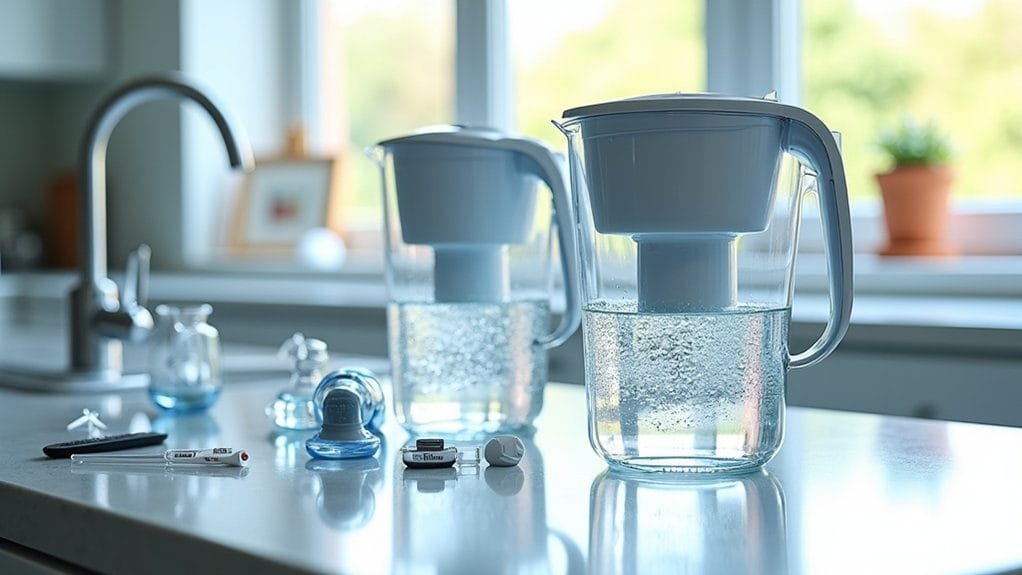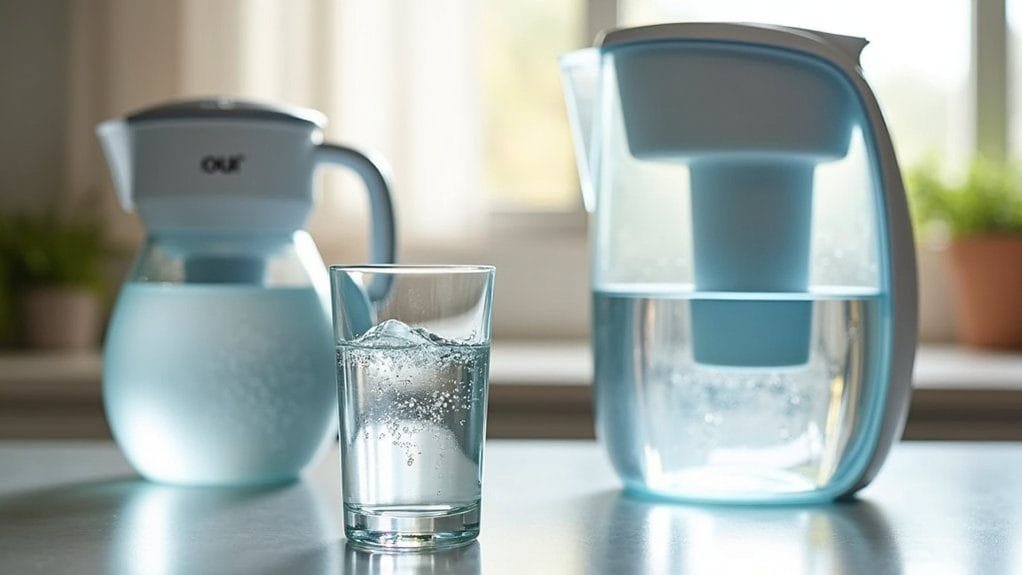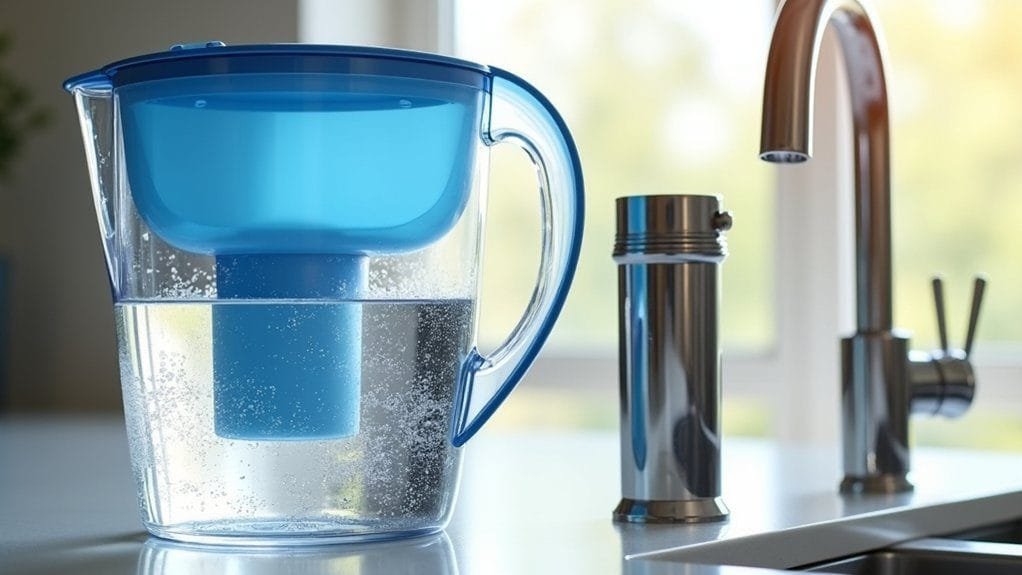You’ll want PUR’s water filter for superior contaminant removal. Their Maxion Filter Technology eliminates 10 times more impurities than Brita, targeting lead, microplastics, and mercury more effectively. While Brita handles basic filtration, PUR’s advanced system provides thorough protection. The filter’s certified performance guarantees you’re getting cleaner, safer drinking water. Curious about the full filtration breakdown? Keep scrolling to uncover the detailed comparison.
Key Takeaways
- PUR filters are certified to remove 10 times more impurities compared to Brita, demonstrating superior contaminant reduction capabilities.
- PUR specifically targets a broader range of substances including lead, mercury, microplastics, and chlorine by-products more effectively than Brita.
- While Brita primarily focuses on chlorine and heavy metals removal, PUR’s Basic Pitcher Filter addresses ten times more substances.
- Both water filter brands meet NSF and WQA certification standards, ensuring reliable performance and water quality protection.
- PUR’s Maxion Filter Technology provides a more thorough filtration mechanism, offering enhanced protection against various water contaminants.
Understanding Water Filtration Technology


While water filtration might seem straightforward, the technology behind Brita and PUR filters reveals significant differences in contaminant removal capabilities. PUR filters leverage advanced Maxion Filter Technology, which enhances their ability to remove a broader spectrum of harmful substances compared to traditional water filtration systems. Their technology specifically targets lead, microplastics, and chlorine by-products more effectively than Brita’s Granular Activated Carbon approach.
When you’re evaluating water filtration systems, understanding these technological distinctions matters. PUR filters reduce contaminants at a substantially higher rate, with the PUR Plus pitcher filter certified to remove 10 times more impurities than competing brands. Both manufacturers meet NSF and WQA certification standards, but PUR’s sophisticated filtration mechanism provides more thorough protection for your drinking water.
Contaminant Removal Performance
Building upon the technological foundations of water filtration, the contaminant removal performance emerges as a critical metric for comparing Brita and PUR water filters. PUR filters demonstrate superior contaminant removal capabilities, certified to reduce a broader spectrum of substances including lead, microplastics, and mercury. Their Maxion Filter Technology enables more thorough protection compared to Brita’s more limited filtration approach.
While Brita filters primarily target chlorine and heavy metals, PUR’s Basic Pitcher Filter effectively addresses ten times more substances. Independent testing reveals nuanced performance variations, with some alternative brands like ZeroWater achieving near-complete contaminant elimination. Consumers seeking robust water purification should prioritize filters demonstrating extensive certification and thorough contaminant removal profiles across multiple potential water impurities.
Taste and Water Quality Comparison


Most water filter consumers prioritize taste and quality, making the Brita versus PUR comparison a critical evaluation of performance nuances. In taste tests, Brita emerged as the preferred option, described as “most clean” with a pure profile, while PUR was rated “clean and invigorating” with no discernible aftertaste. The water quality differences reveal subtle yet significant variations in filtration performance.
When evaluating contaminant removal alongside taste, both brands demonstrate robust capabilities. Brita’s filters provide superior taste consistency, whereas PUR excels in thorough contaminant reduction. Your selection should balance personal preference for water flavor with specific filtration needs. The nuanced distinctions between these brands highlight that ideal water quality isn’t solely about elimination of impurities, but also about delivering a crisp, palatable drinking experience.
Cost Analysis and Filter Lifespan
Because water filter consumers prioritize both performance and affordability, a thorough cost analysis reveals critical differences between Brita and Pur’s filter lifespan and replacement filters. You’ll find that Brita’s Standard filter costs approximately $4.17, while Pur’s Basic filter is priced at $6.00, making Brita more budget-friendly. When examining filter lifespan, Brita’s Elite filter outperforms Pur’s Plus filter, lasting up to 120 gallons compared to Pur’s mere 30 gallons. This significant difference translates to substantial cost savings over time. Annually, you’ll spend around $25.02 on Brita Standard filters versus $49.98 for Pur Plus filters. Both brands offer pitchers in similar price ranges ($25-$40 for Brita, $30-$35 for Pur), but Brita provides more economical long-term filtration solutions.
Pitcher and Faucet Filter Design


Water filtration design represents a critical battleground where Brita and PUR compete for consumer preference through innovative pitcher and faucet filter architectures. You’ll find Brita offers versatile pitcher filters like the UltraMax (27-cup) and Metro Pitcher (6-cup), accommodating diverse household water consumption needs. The PUR pitcher, specifically the Plus 30-cup dispenser, prioritizes contaminant removal despite a more utilitarian aesthetic. When examining faucet-mounted solutions, the Brita Basic model delivers a robust 0.7 GPM flow rate and 100-gallon capacity, while PUR’s FM2500V provides a more conservative 0.44 GPM with an integrated filter change indicator. Both brands maintain NSF/ANSI certification, ensuring rigorous performance standards. Your selection ultimately depends on balancing design preferences with filtration efficacy and household water requirements.
Expert Recommendations and Final Verdict
Expert filtration specialists unanimously converge on a nuanced recommendation when comparing Brita and PUR water filters. If you’re seeking thorough contaminant removal, PUR emerges as the superior choice, capable of eliminating 10 times more substances including lead and microplastics. However, budget-conscious consumers will find Brita’s longer filter lifespan and lower replacement costs more appealing.
| Filter Brand | Chlorine Removal | Contaminant Range | Cost-Effectiveness | Taste Performance |
|---|---|---|---|---|
| PUR | High | Extensive | Moderate | Clean & Revitalizing |
| Brita | Moderate | Standard | High | Most Pure |
For households with high concentrations of water impurities, invest in PUR’s advanced filtration technology. If your water quality is relatively stable, Brita’s filter pitchers provide reliable, economical performance. Your specific water quality and budget will ultimately determine the most suitable choice.
Frequently Asked Questions
Is the PUR Water Filter Better Than Brita?
If you’re seeking superior contaminant removal, PUR’s advantages outweigh Brita’s limitations. You’ll get more filtration efficiency, with PUR reducing 10 times more substances, making it the technically superior choice for thorough water purification.
Which Water Filter Jug Removes the Most Contaminants?
You’re tired of murky water, right? PUR’s Maxion Filter Technology outperforms Brita in filter effectiveness comparison, removing 10x more contaminants through advanced water filter types and precise contaminant removal techniques, ensuring cleaner, safer drinking water.
How Many Contaminants Does PUR Water Filter Remove?
You’ll find PUR filters effectively remove up to 10 different contaminants, including lead, microplastics, and chlorine. Their impressive lifespan and low-maintenance design guarantee peak performance, making them a scientifically precise solution for thorough water filtration.
What Do Brita Filters Not Remove?
Imagine finding lead in your tap water after trusting your Brita. You’ll discover Brita filters ineffectively remove heavy metals, pesticides, pharmaceuticals, microplastics, and fluoride, highlighting limitations in their filtration technology’s extensive contaminant removal capabilities.
Which Water Filter is More Effective in Removing Contaminants Compared to Air Purification Systems?
When considering effectiveness in removing contaminants, water filters are specifically designed to tackle various impurities in water, while air purification systems focus on airborne particles. For those debating “dyson or levoit for large room air purification,” it’s essential to analyze the capacities of both, as they serve different purposes.
Conclusion
When comparing Brita and PUR, you’ll find both systems effectively reduce contaminants, but nuanced differences matter. You’ll want performance over aesthetics, precision over marketing claims. Whether you choose Brita’s advanced carbon filtration or PUR’s multi-stage technology, you’re investing in cleaner, safer drinking water. Ultimately, your specific water quality and budget will determine the best filtration solution for your household’s unique needs.
